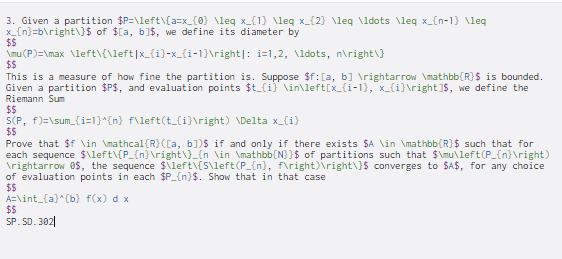Answered step by step
Verified Expert Solution
Question
1 Approved Answer
$$ 3. Given a partition $P=left{a=x_{ leq x_{1} leq x_{2} leq ldots leq x_{n-1} leq x_{n}=b ight}$ of $[a, b]$, we define its diameter by

Step by Step Solution
There are 3 Steps involved in it
Step: 1

Get Instant Access to Expert-Tailored Solutions
See step-by-step solutions with expert insights and AI powered tools for academic success
Step: 2

Step: 3

Ace Your Homework with AI
Get the answers you need in no time with our AI-driven, step-by-step assistance
Get Started


